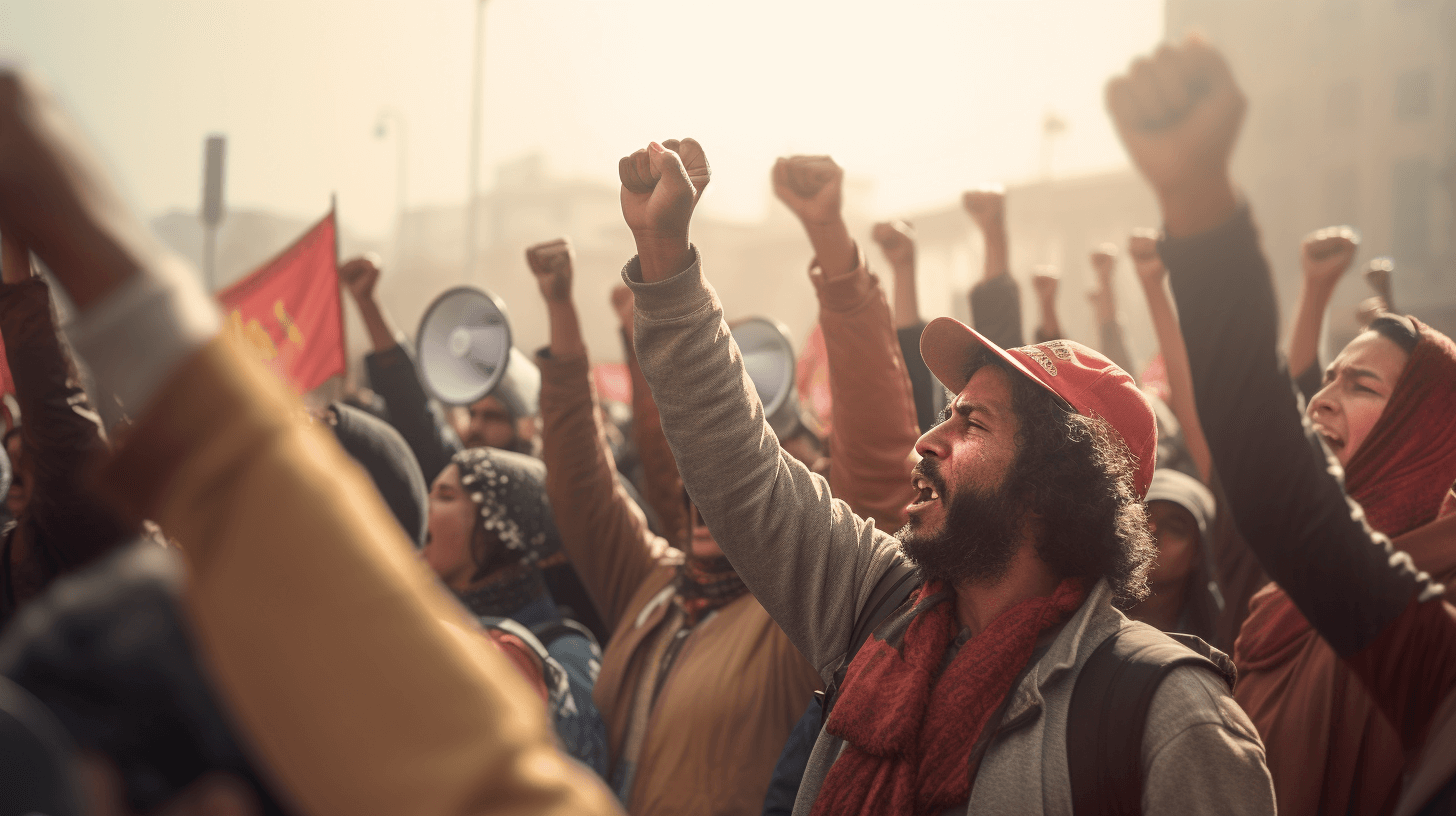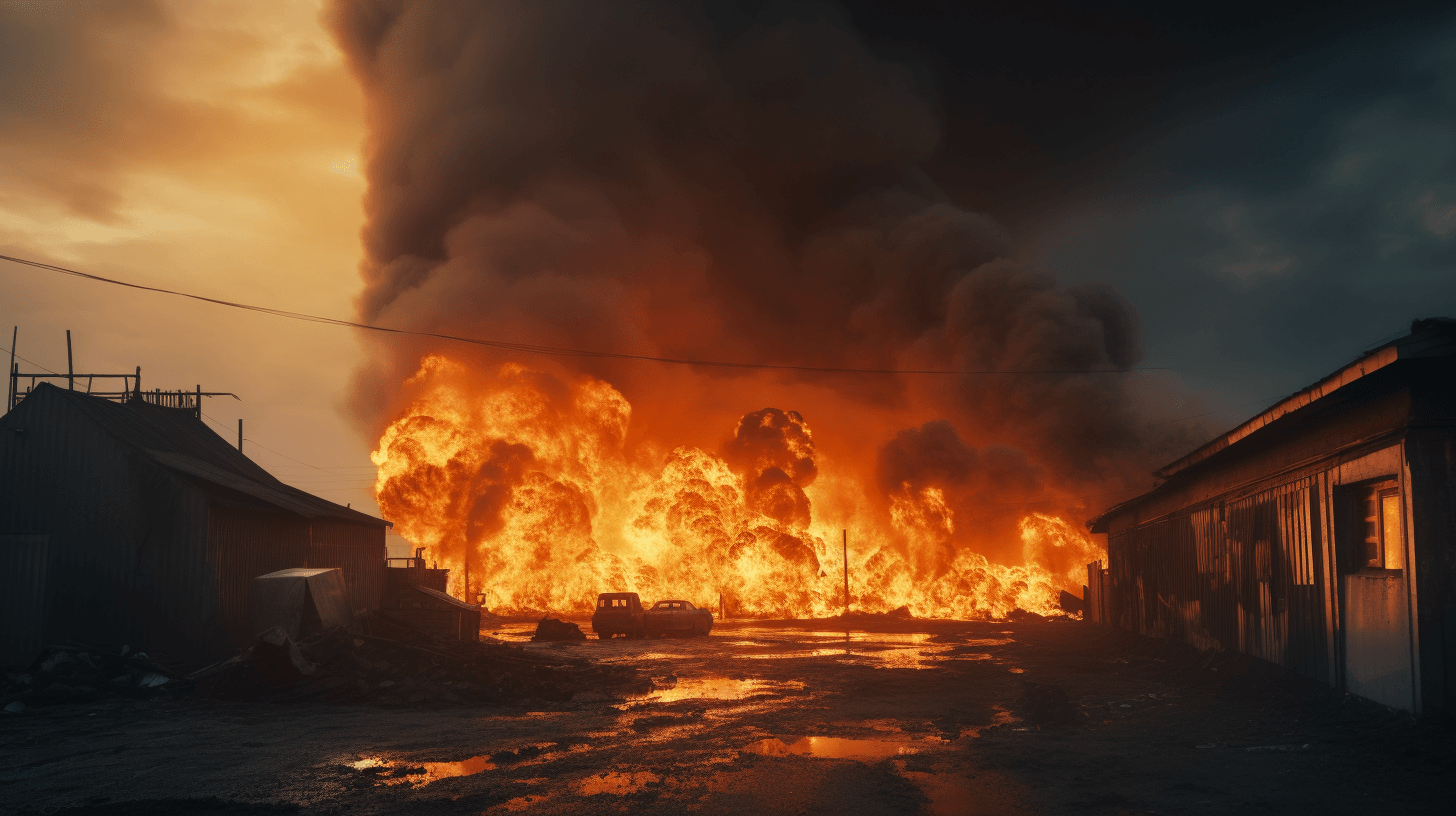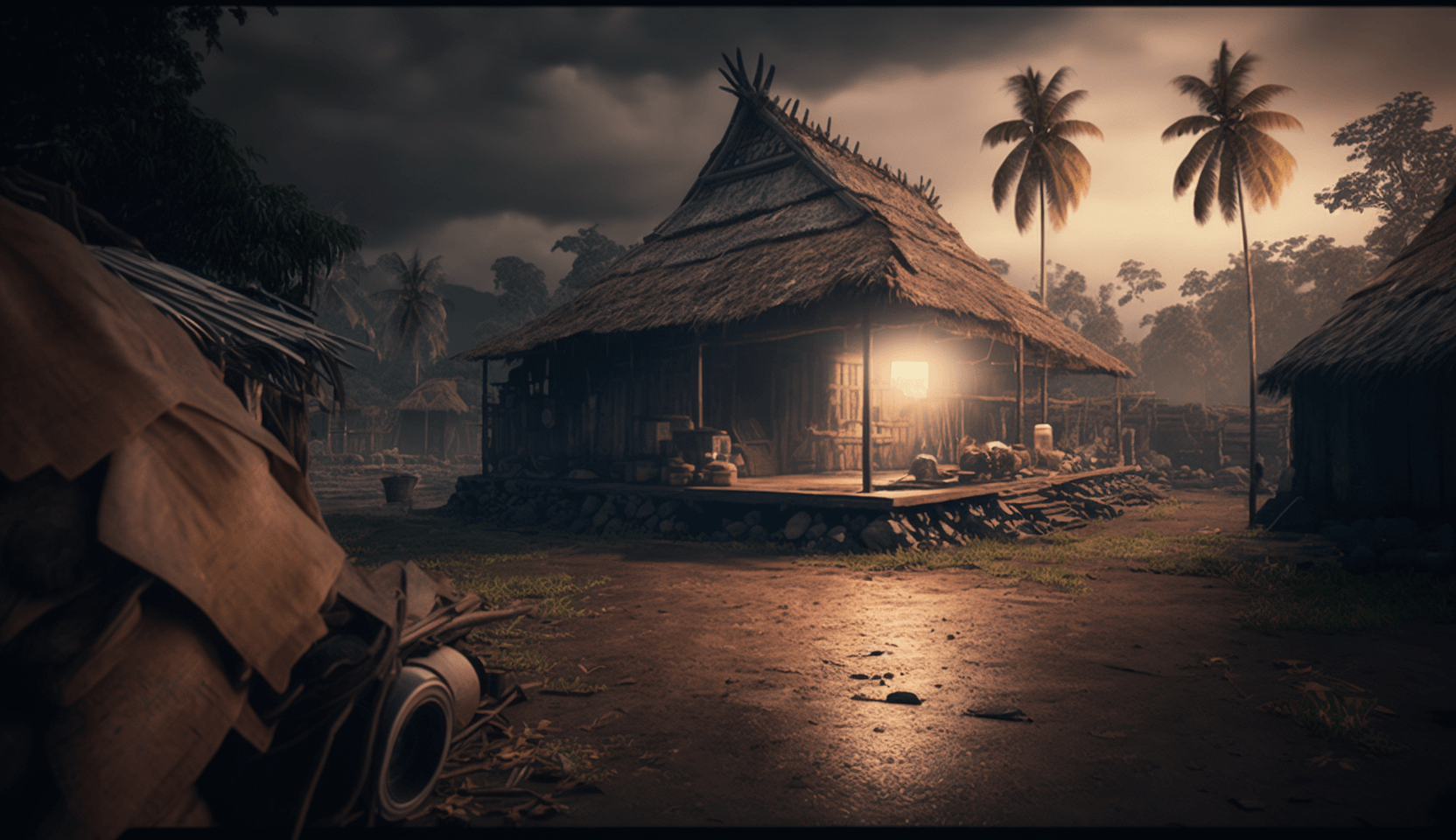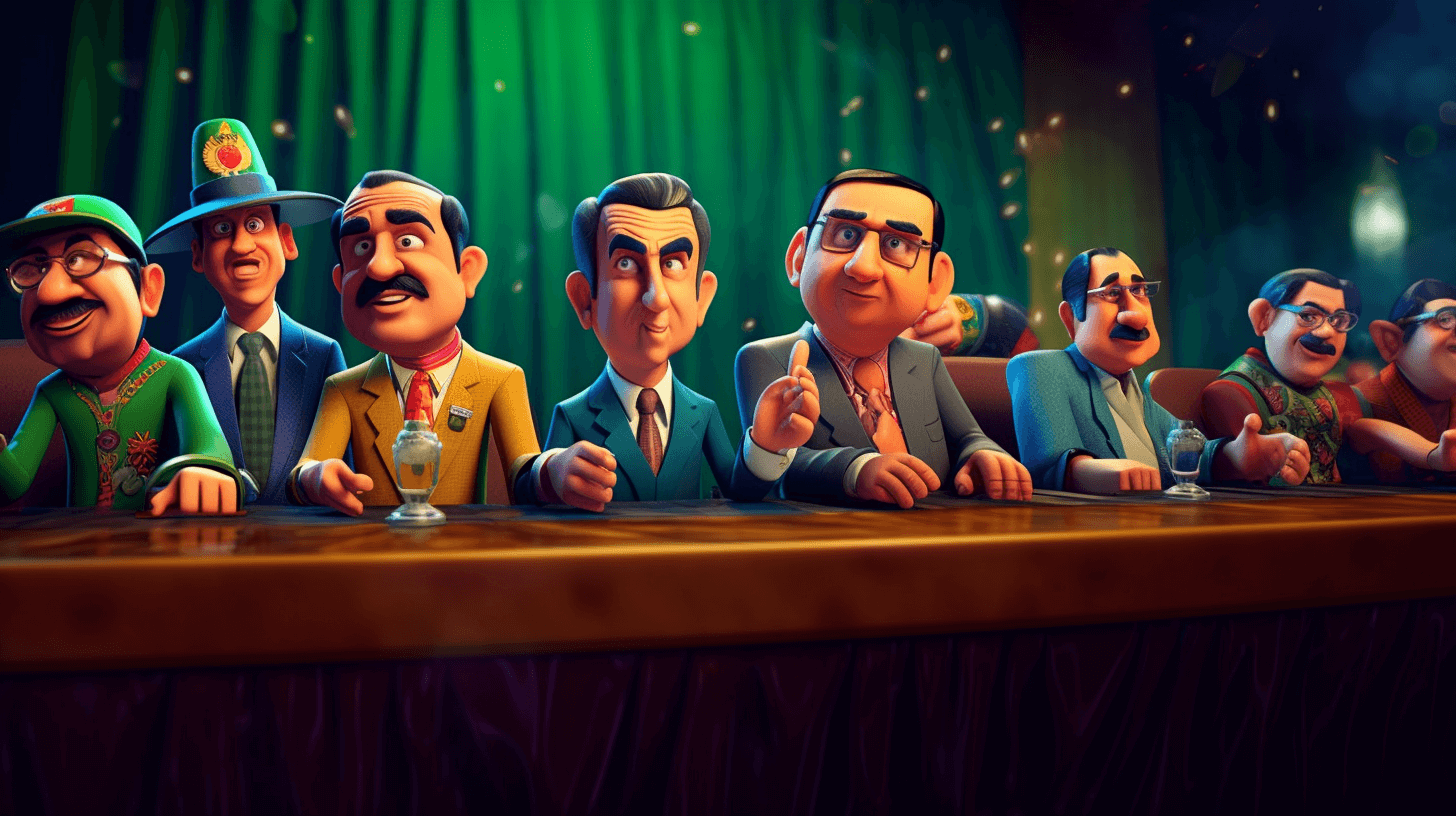🇵🇪👮♂️🔍 Securitah Forces No Get Big Eye Afta Protestahs Mahke
Inside Peru, wen da securitah forces mahke da protestahs, da investigations all pau wit no charges, an’ dat make da peepo lose trus’ in dea gummament, no good, no good.
Antonia Huillca, she stay living inside one small village in Peru, an’ she wen show us one stack of documents, supposed to bring hope. Dem documents, dey was part of one investigation about her husband, Quintino Cereceda, who wen leave one morning inside 2016 fo’ join one protest agains’ one new copper mine, but he neva come back. Antonia no can read, but she know wassup: one photo of her husband’s dead body, one bullet wound to his forehead; da police wen say dey wen shoot live bullets while da protestahs wen throw rocks; da logo of da mining company, driving dea trucks ovah da dusty roads, making da villagers all mad. 📜🏡📸🔫🚛
But now, da investigation stay pau. Antonia, one 51-year-old Quechua farmer, she say, “All these years an’ still no justice. Feels like we no even exist,” as one storm start fo’ form ovah her village, Choquecca, inside da southern Andes mountains. 🌩️🏔️
Plenny times, same kine stuff happen inside Peru: dey open investigations wen da securitah forces kill da peepo at protests, especially inside da poor Indigenous an’ rural areas, but den dey quietly close ’em, saying no get enough evidence.
Now, afta da president wen get impeached last December an’ had all da antigovernment demonstrations, mo’ peepo wen mahke den evah before, an’ dat wen put da spotlight on top da accusations of abuse by da securitah officials, making everybody wonduh why all da previous killings still stay unsolved. At least 49 civilians wen mahke inside da clashes wit da police or military since President Pedro Castillo got impeached, wen try fo’ dissolve Congress, an’ rule by decree. Das according to da ombudsman’s office, da numbas no lie, brah. 📰🤔🔫
One investigation inside March by da New York Times wen find out dat in three towns wea da deadly clashes happen, da police an’ soldiers wen shoot da civilians using lethal ammunition, an’ dey wen shoot at da protestahs running away, an’ dey wen kill da unarmed peepo, like dey wen throw away dea own rules.
José Cárdenas, one braddah who wen lose his younger braddah Alberto inside da protests back in 2015, he say, “We wen go through da same kine thing. My braddah neva die in one accident. Dey wen shoot him.” But till now, no charges wen come out from da investigation. 👥🔫💔
Da lack of accountability fo’ excessive use of force by da securitah agencies, dat one big human rights failure, say da civil rights organizations, an’ das why da peepo no trus’ da authorities no mo’.
Inside Peru, mo’ than 200 civilians wen mahke inside da police an’ military crackdowns on top protests inside da last two decades, according to da National Human Rights Coordinator, one advocacy group. But ova da same time, da prosecutors neva win one single conviction against da police or military officers or dea bosses fo’ da killings at da protests. Human rights activists, lawyers, an’ two state prosecutors, who no like mention dea names cause dey no ‘spose to talk to da news media, dey all say da same kine. No even one trial come out from most cases, an’ instead, da protestahs an’ protest leaders get accused of vandalism or incitin’ public disorder.
“It’s all back assward — when it’s ’bout punishin’ da campesinos, dey move real fast,” say David Velazco, one human rights lawyer who wen defend mo’ than 200 rural protestahs on different charges, like vandalism an’ disturbin’ da public order.
Da prime minister’s office an’ da national prosecutor’s office no like talk, no response to da many requests fo’ comment. An’ da Interior Ministry, dey no like answer questions.
Da current president of da country, Dina Boluarte, who wen take ovah afta Mr. Castillo wen get kicked out, she blame da deadly clashes on da protestahs, sayin’ dey wen block da roads an’ attack da securitah forces wit rocks an’ slingshots.
Investigations inside da rural areas can be tough, da legal analysts say, cause sometimes hard fo’ tell if da police stay in real danger when dey get outnumbered by da protestahs. Rolando Luque, who keeps an eye on da conflicts inside da ombudsman’s office, he say, “At some point, while dey doin’ dea duties, dey could get overtaken by da protestahs,” an’ “dey could get killed wit dea own weapons.” He wen see dat happen in one clash inside da Amazon back in 2009, when protestahs wen fight wit da police an’ mahke 23 officers an’ 10 civilians. Da officers, he say, “get taken into da forest an’ executed.”📸🔫🚛
Mo’ problems, da police an’ da military, dey usually no like share details ’bout dea operations, dat’s what da lawyers who work on da cases of civilian deaths say. An’ da cases usually go to overworked prosecutors, some of ’em handle ova 200 cases at one time.
Da prosecutors no like investigate da big shots inside da gummament who maybe wen give da green light or support da use of lethal force, or da role of da mining companies who wen hire da police fo’ private securitah, say da human rights activists.
“No get any real desire inside da institutions fo’ deal wit da issue,” say Carlos Rivera, one human rights lawyer.
Peru no da only South American democracy wea unarmed civilians wen mahke inside protests, wen da anger of da peepo boil ova into da streets. Javier Puente, one scholar of Andean studies at Smith College inside Massachusetts, he say da militaries an’ da police been helpin’ weak Latin American leaders compensate fo’ da lack of strong parties an’ oddah institutions, an’ dat jus’ make violence one normal solution to political problems.
“Da price Peru gotta pay fo’ dis kinda institutionalism dat da military an’ da police bring is impunity,” say Mr. Puente.
Back in 2000, Peru wen return to democracy afta years of authoritarian rule, an’ da peepo wen get all excited fo’ get bettah access to justice an’ political representation, an’ fo’ stop da police an’ military abuses, especially against da Indigenous peepo.
But instead, as Peru wen experience one rapid economic expansion, all dose hopes wen get left behind. One democratically elected president afta anotha wen get caught up in corruption scandals. Inequality stay high, social conflicts keep brewin’, an’ da global commodities boom wen bring all dese big mining projects to da rural Indigenous regions.
“Dey neva listen to us. All dey do is send in da police,” say Melchor Yauri, one member of an Indigenous community in southern Peru.
He say his faddah, Félix, wen get shot in da eye wit one rubber bullet by da police during one protest back in 2012, all ’bout da pollution from one copper mine, an’ he wen mahke from da infection in his wounds. An’ da investigation into his death, dat was all closed up back in 2015.
Now, inside Peru, dey like fo’ give da police even mo’ immunity unda one bill in Congress, dat would move da trials involving officers from civilian courts to one military-police court.
While oddah countries in da neighborhood, like Chile an’ Colombia, wen elect leaders who promise change an’ address excessive force, abuse, an’ impunity, in Peru it look like da problems gettin’ even mo’ rooted, say Will Freeman, one fellow in Latin America studies at da Council on Foreign Relations, one research institute inside da U.S.🚫👮♂️
Ms. Boluarte an’ most lawmakers, dey no seem interested in even pretendin’ to put pressure on fo’ accountability or reforms, say Mr. Freeman.
Days afta nine civilians wen mahke in clashes wit da security forces last December, Ms. Boluarte wen promote her defense minister to prime minister. Her administration say da police handle da protests “impeccably” an’ propose longer prison sentences fo’ people who damage property or disrupt public order.
Da relatives of da recent clash victims, dey say dey no trust da head of da prosecutor’s office, Patricia Benavides, afta she wen remove da prosecutors who specialize in human rights violations from da investigations, an’ she wen move da cases from da rural areas to Lima, da capital. Dat make it harder fo’ da family members fo’ keep tabs on da progress of da cases.
Aftah her husband wen mahke at da mining protest, Ms. Huillca say her herd of sheep wen shrink from 500 to 30, cause she had fo’ sell ’em fo’ support her children’s education. An’ even now, when she see da police, she still feel scared. “I scared dey goin’ do da same ting to me,” she say. 💔🐑👥🚫👮♂️
NOW IN ENGLISH
🇵🇪👮♂️🔍 As Protesters Die, a Nation’s Security Forces Face Little Scrutiny
Inside Peru, when the security forces kill the protesters, the investigations all end without any charges, and that makes the people lose trust in their government, not good, not good.
Antonia Huillca, she lives in a small village in Peru, and she showed us a stack of documents, supposed to bring hope. Those documents were part of an investigation about her husband, Quintino Cereceda, who left one morning in 2016 to join a protest against a new copper mine, but he never came back. Antonia cannot read, but she knows what’s up: a photo of her husband’s dead body, a bullet wound to his forehead; the police said they shot live bullets while the protesters threw rocks; the logo of the mining company, driving their trucks over dusty roads, making the villagers all mad. 📜🏡📸🔫🚛
But now, the investigation is closed. Antonia, a 51-year-old Quechua farmer, said, “All these years and still no justice. Feels like we don’t even exist,” as a storm starts to form over her village, Choquecca, in the southern Andes mountains. 🌩️🏔️
Many times, the same thing happens in Peru: they open investigations when the security forces kill the people at protests, especially in the poor Indigenous and rural areas, but then they quietly close them, citing a lack of evidence.
Now, after the president was impeached last December and there were more antigovernment demonstrations, more people died than ever before, and that puts the spotlight on the accusations of abuse by the security officials, making everybody wonder why all the previous killings remain unsolved. At least 49 civilians were killed in clashes with the police or military since President Pedro Castillo was impeached, when he tried to dissolve Congress and rule by decree. That’s according to the ombudsman’s office, the numbers don’t lie, bro. 📰🤔🔫
An investigation in March by the New York Times found that in three towns where the deadly clashes happened, the police and soldiers shot civilians using lethal ammunition, they shot at the fleeing protesters, and they killed unarmed people, violating their own rules.
José Cárdenas, whose younger brother Alberto was killed in the protests back in 2015, said, “We went through the same thing. My brother didn’t die in an accident. He was shot.” But so far, no charges have come out from the investigation. 👥🔫💔
The lack of accountability for excessive use of force by the security agencies is a serious human rights failure, according to civil rights organizations, undermining people’s faith in the authorities.
Inside Peru, more than 200 civilians have been killed in police and military crackdowns on protests in the past two decades, according to the National Human Rights Coordinator, an advocacy group. But over that same time, prosecutors have not won a single conviction against police or military officers or their superiors for the killings at the protests. Human rights activists, lawyers, and two state prosecutors, who don’t want to mention their names because they’re not supposed to talk to the news media, they all say the same thing. Not even a single trial has come out from most cases, and instead, the protesters and protest leaders get accused of vandalism or inciting public disorder.
“It’s all backward—when it’s about punishing the campesinos, they move real fast,” says David Velazco, a human rights lawyer who has defended more than 200 rural protesters on different charges, like vandalism and disturbing the public order.
The prime minister’s office and the national prosecutor’s office didn’t respond to multiple requests for comment. And the Interior Ministry declined to answer questions.
The current president of the country, Dina Boluarte, who took over after Mr. Castillo was ousted, blames the deadly clashes on the protesters, saying they blocked the roads and attacked the security forces with rocks and slingshots.
Investigations involving clashes in rural areas can be challenging, legal analysts say, partly because it can be hard to determine whether the police face a legitimate threat to their lives when they are outnumbered by protesters, said Rolando Luque, who monitors conflicts in the ombudsman’s office.📸🔫🚛
“At some point, while carrying out their duties, they could be overtaken by protesters,” he said, and “they could be killed with their own weapons.”
That is what happened during a clash in the Amazon between protesters and the police in 2009 that left 23 officers and 10 civilians dead, said Mr. Luque, who witnessed the aftermath. The officers, he said, “were taken into the forest and executed.”
Further complicating matters, the police and the military often refuse to share details about their operations, according to lawyers involved in cases of civilian deaths. And cases tend to be assigned to overworked prosecutors, some of whom manage more than 200 at a time.
Prosecutors have been reluctant to investigate top government officials who may have authorized or encouraged the use of lethal force, or the role of mining companies that hire the police for private security, human rights activists said.🚫👮♂️
“There’s a clear lack of institutional will to tackle the issue,” said Carlos Rivera, a human rights lawyer.
Peru is not the only South American democracy where unarmed civilians have been killed in protests as popular discontent has boiled over into the street.
Javier Puente, a scholar of Andean studies at Smith College in Massachusetts, said militaries and the police have long helped weak Latin American leaders make up for the lack of strong parties and other institutions, normalizing violent solutions to political problems.
“The price that Peru pays for the form of institutionalism that the military and the police offer is impunity,” Mr. Puente said.
Back in 2000, Peru returned to democracy after years of authoritarian rule, and the people were hopeful for broader access to justice and political representation, and to put an end to the police and military abuses, especially against Indigenous people.
But instead, as Peru experienced rapid economic expansion, those hopes were left behind. One democratically elected president after another got caught up in corruption scandals. Inequality remained high, social conflicts festered, and a global commodities boom brought huge mining projects to rural Indigenous regions.
“They never listen to us. They just send in the police,” said Melchor Yauri, a member of an Indigenous community in southern Peru.
He said his father, Félix, was shot in the eye with a rubber bullet by the police during a protest in 2012 over pollution from a copper mine and died from an infection to his wounds. An investigation into his death was closed in 2015.
Now, in Peru, they want to give the police even more immunity under a proposed congressional bill that would shift trials involving officers from civilian courts to a military-police court.
While neighboring countries, like Chile and Colombia, have elected leaders who promised changes to address excessive force, abuse, and impunity, in Peru, it seems that the problems are becoming more entrenched, said Will Freeman, a fellow in Latin America studies at the Council on Foreign Relations, a U.S. research institute.
Ms. Boluarte and most lawmakers “don’t even seem interested in pretending to put pressure behind accountability or reforms,” Mr. Freeman said.
Days after nine civilians were killed in clashes with security forces in December, Ms. Boluarte promoted her defense minister to prime minister. Her administration has described the police’s handling of protests as “impeccable” and proposed longer prison sentences for people who damage property or disrupt public order.
The relatives of victims of recent clashes say they don’t trust the head of the prosecutor’s office, Patricia Benavides, after she removed prosecutors who specialize in human rights violations from investigations and moved cases from rural areas to Lima, the capital, making it harder for family members to monitor their progress.
After her husband’s death at the mining protest, Ms. Huillca said her herd of sheep dwindled to 30 from 500, as she has sold them off to support her children’s education.
To this day, she freezes up when she sees the police. “I’m afraid they’ll do the same thing to me,” she said. 💔🐑👥🚫👮♂️







